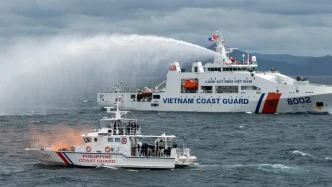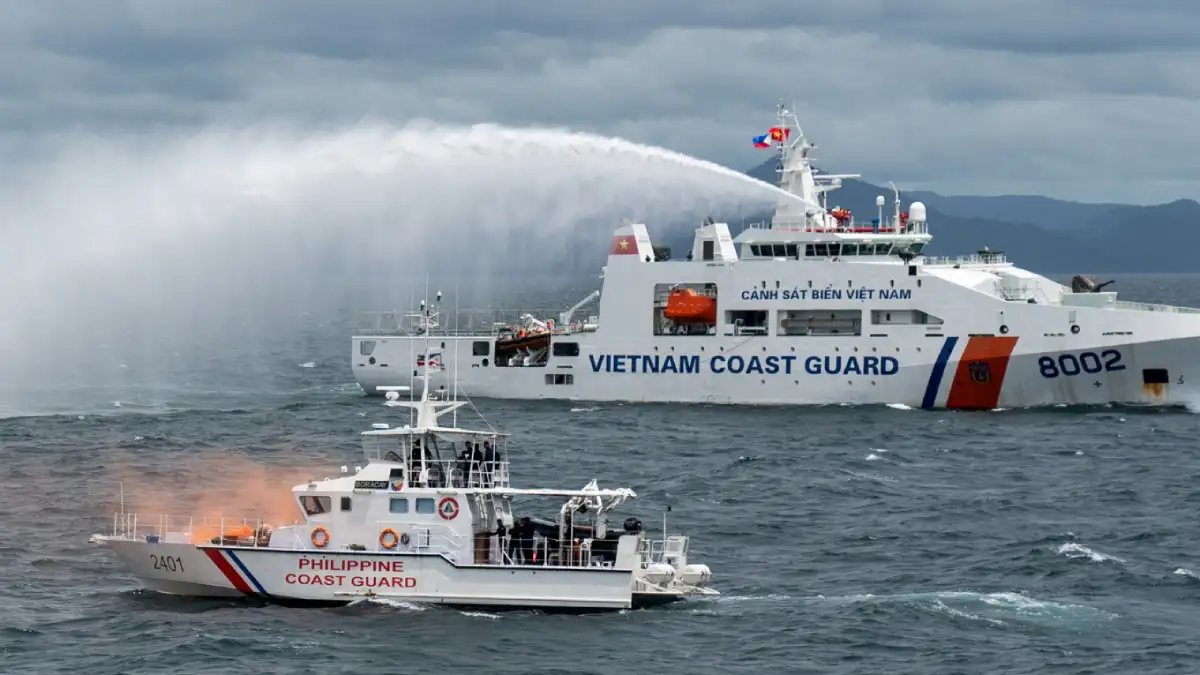ASEAN Faces Pressure to Act on South China Sea Disputes Rising tensions in the South China Sea, a critical global trade route, are testing the Association of Southeast Asian Nations (ASEAN) as Philippine officials and analysts demand a stronger response to maritime disputes. With China’s expansive claims clashing with the exclusive economic zones (EEZs) of the Philippines, Vietnam, and Malaysia, and internal disagreements among ASEAN members, the bloc’s consensus-driven approach is under scrutiny. Calls for a binding Code of Conduct (COC) and resolution of intra-ASEAN disputes highlight the urgency for ASEAN to assert its role or risk losing regional influence amid growing geopolitical rivalries.
South China Sea A Global Flashpoint
The South China Sea, handling approximately $3.4 trillion in trade annually, is a strategic and economic lifeline for Southeast Asia. China’s “nine-dash line” claims overlap with the EEZs of ASEAN states, particularly the Philippines, Vietnam, and Malaysia, leading to frequent confrontations, such as recent incidents near Scarborough Shoal involving Chinese and Philippine vessels. The Philippines relies on the 2016 Permanent Court of Arbitration (PCA) ruling, which rejected China’s claims within Manila’s EEZ, but Beijing’s non-compliance and aggressive coast guard patrols have escalated tensions. Beyond ASEAN, global powers like the United States, Japan, and Australia are drawn in, with U.S. Freedom of Navigation Operations (FONOPs) challenging China’s assertions, earning Manila’s support but raising concerns among other ASEAN members about militarization. The sea’s economic stakes—rich fish stocks and potential oil and gas reserves—underscore the need for a stable, rules-based framework, which ASEAN has struggled to deliver due to its cautious diplomacy and diverse member interests.
ASEAN’s Hesitant Response
ASEAN’s consensus-driven model, designed to promote harmony, often produces vague statements that avoid directly addressing China’s actions, undermining the bloc’s credibility. “We closely follow with concern the recent developments in the South China Sea that may undermine peace, security, and stability in the region” ASEAN foreign ministers stated on December 30, 2023, reflecting concern but avoiding naming China [thediplomat.com/2024/01/asean-foreign-ministers-speak-out-about-south-china-sea-tensions/]. The Code of Conduct (COC), under negotiation with China for over two decades, remains stalled due to disputes over enforcement and scope. Philippine President Ferdinand Marcos Jr. has criticized the slow progress, stating, “There should be more urgency in the pace of the negotiations of the ASEAN-China code of conduct” during an ASEAN summit in October 2024 [reuters.com/world/asia-pacific/philippines-calls-urgency-china-asean-negotiating-south-china-sea-code-2024-10-10/]. Economic ties to China, particularly among non-claimant states like Cambodia and Laos, complicate a unified stance, leaving ASEAN struggling to balance diplomacy with decisive action.
Intra-ASEAN Disputes Internal maritime disputes among ASEAN members, notably over the Spratly Islands, further weaken the bloc’s cohesion. Vietnam, Malaysia, and the Philippines maintain overlapping claims, often resolved bilaterally without international arbitration, a practice that hinders regional unity. “Now we have Vietnam, Malaysia and the Philippines disputing over the Spratly Islands. It’s time to submit it to arbitration so we can move on. We belong to one community” urged Antonio T. Carpio, former justice of the Philippines’ Supreme Court, in late June 2025 [asianews.network/asean-must-do-more-in-maritime-disputes-philippine-analysts]. Julio Amador, an international relations expert at FACTS Asia, added, “We are neighbors that are able to resolve and manage our disputes peacefully. We need to be able to show to the world as a nation, as an ASEAN community, we depend on the rule of law” [asianews.network/asean-must-do-more-in-maritime-disputes-philippine-analysts]. Resolving these disputes through arbitration, analysts argue, is critical for ASEAN to project strength and credibility against external pressures.
Philippines’ Balancing Act
For the Philippines, the South China Sea is both a sovereignty issue and an economic lifeline, with its fish stocks and potential energy resources vital to coastal communities. Manila has leaned on the United Nations Convention on the Law of the Sea (UNCLOS) and the 2016 PCA ruling to assert its rights, but faces challenges within ASEAN due to differing member priorities. Under President Ferdinand Marcos Jr., the Philippines has bolstered alliances with the United States and other Western partners through joint military exercises, complementing its push for ASEAN to uphold a rules-based order. However, resistance from members like Cambodia, with strong economic ties to China, complicates this agenda. Philippine analysts emphasize that ASEAN must strengthen its internal framework to avoid over-reliance on external powers, ensuring the bloc remains a central mediator in regional affairs. As negotiations for a COC falter, proposals for interim measures—such as joint patrols, transparency in military activities, and a crisis communication mechanism—aim to build trust. With a mid-2026 target for the COC looking uncertain, the Philippines’ leadership within ASEAN will be pivotal, but the bloc’s ability to adapt remains the key question for Southeast Asia’s future stability.
















